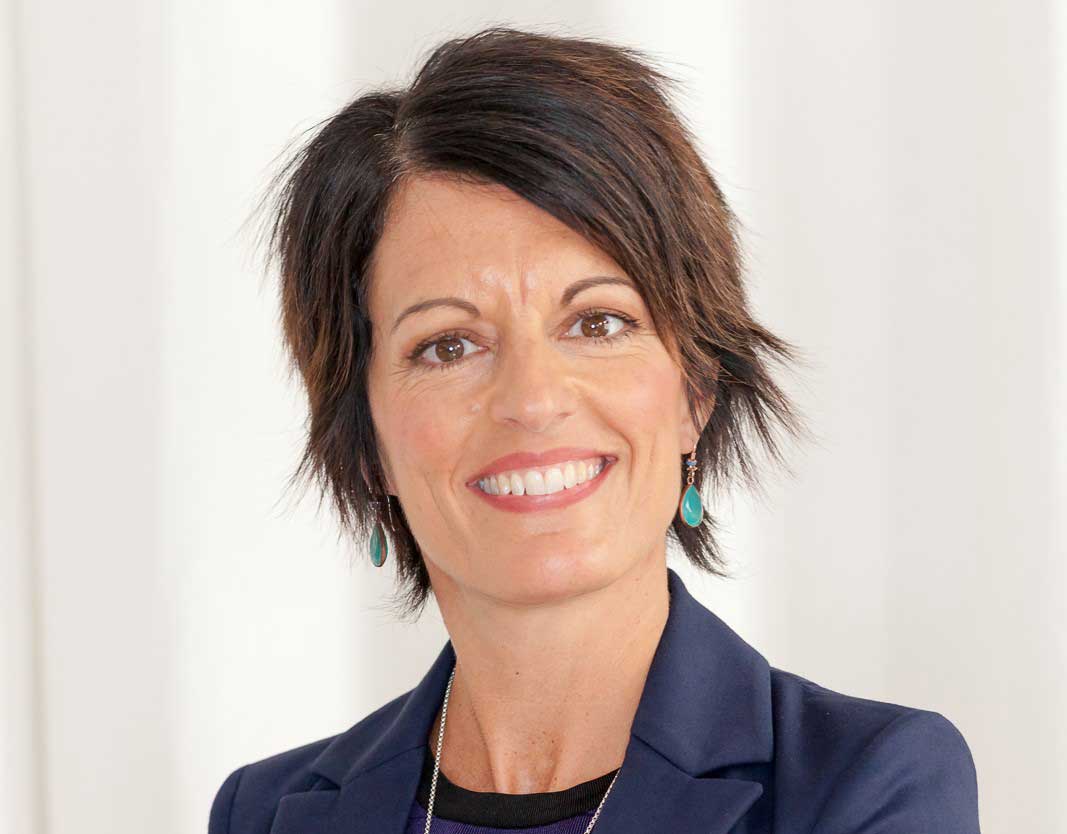Mentoring in Reinsurance: The Perfect Add-on for Your Career!
By Ronald Poon Affat
Reinsurance News, June 2023

In this interview, Caroline Grégoire, formerly from Hannover Re, and now international mentor, coach, trainer, and speaker, shares her views on how mentoring can support you on your career path and how it also benefits the reinsurance industry as a whole.
Ronald Poon Affat (RPA): Hi Caroline, I came across your profile last year; your Christmas video on YouTube made me laugh so hard!
Looking at your background and experience, I realized that we have similar paths, e.g., actuary, reinsurance, international experience. I was curious to know more about the topic of mentoring in the reinsurance business.
I understand that you have worked as an actuary, a risk manager and held different leadership positions in international contexts. Before we dig deeper into the topic of mentoring, tell me more about your path.
Caroline Grégoire (CG): After more than 20 years working as an actuary and risk manager, I’ve now been working as a coach, mentor, trainer, and speaker for the last seven years. I gathered experience in the reinsurance business in Germany and as a pension consultant in Sweden. The last position that I held in a corporate context was head of operational risk and risk reporting for the Hannover Re Group in Hannover, Germany.
I’ve always been working in international contexts and often found myself leading various teams and projects. Originally, I’m from the Montreal area in Canada, and currently based in Portugal. I like to say that “internationality” is part of my DNA! In my leadership role at Hannover Re, I loved to organize workshops and conferences worldwide for the subsidiaries and branches of the group regarding risk management.
Then, I left the pure technical side of the actuarial/risk management/reinsurance business to focus on topics like communication, resilience, motivation, leadership, and culture. The clients I work with are leaders and managers in the finance, insurance, and actuarial sectors, often working for international organizations. I provide them with tools to reach their goals and to perform at their best!
My clients are based everywhere around the globe. In this context, my fluency in French, English, German and Swedish is a key advantage. Also, I’m currently learning Portuguese.
RPA: You work both as a mentor and a coach. How do you see the difference between mentoring and coaching?
CG: If we are to draw a clear line between the two, I would say that a mentor is someone who shares their knowledge, skills and experience, to help another to develop and grow. A coach is someone who provides guidance to another person on their goals and helps them reach their full potential.
So, we could say that mentoring is about transferring knowledge from the mentor to the mentee while coaching is about enhancing, supporting, and empowering the individual to step in and be actively engaged in their own growth and knowledge. A mentoring session often appears like a normal conversation while a coaching session usually requires a reflexion on events or behaviors in order to become aware of the underlying issues and to put in place the needed changes.
When I speak with people who are interested in my services, it’s important to clarify the need the person has, whether it’s to get through a challenging time, to have a sparring partner at their side, to support in a new role, to get a promotion, etc. It then becomes clearer whether my role will be a mentor or a coach.
When I work with a new client, I always make sure that my client defines concrete objectives, regardless of whether we work on a mentoring or a coaching basis. I agree that because I have the coaching tools on top of my own knowledge and experience that the mentor in me benefits from the coach and vice-versa!
The line may not be 100% clear at times, but essentially the importance of my work lies in knowing and noticing that my mentee or “coachee” is making progress towards the objectives that he/she has set.
RPA: How important is mentoring in the reinsurance business?
CG: Mentoring is crucial in the reinsurance business because it helps to facilitate the transfer of knowledge, skills, and experience from experienced professionals to less experienced ones. The mentoring relationships that are built provide support and guidance to individuals as they navigate the complexities of the industry, develop their careers, and build their professional networks.
Mentoring also helps to foster a culture of learning and development within the industry, which can lead to better performance, increased job satisfaction, and stronger employee retention. Ultimately, mentoring is essential to the long-term success of both individuals and the industry as a whole.
We often say that the reinsurance business is based on its people. It’s clear to me that mentoring reinforces this idea in ensuring that the networks and the connections established continue this tradition and allow for innovation at the same time!
RPA: In which aspects of the reinsurance industry have you seen mentoring being used?
CG: There are many aspects of the reinsurance industry where I’ve seen mentoring. First, in career development where mentoring can help individuals navigate their career path, set goals, and develop their professional skills. Similarly, it’s also used within personal development because mentors can provide support and guidance on personal development, such as communication skills, leadership, and time management.
Also, when we think about the technical expertise, experienced mentors can provide guidance on technical aspects of the industry, such as underwriting, risk assessment, and claims management. In the same vein, I know that mentors share their experience and knowledge of the industry, including its trends, challenges, and opportunities.
We already touched on the importance of networks and mentors can introduce mentees to their professional network, which can help younger employees build relationships and expand their knowledge of the industry. Another aspect where I’ve seen mentoring working very well is around diversity and inclusion. Mentoring can help to promote diversity and inclusivity in the industry by providing support and guidance to underrepresented groups.
Overall, mentoring plays a crucial role in helping individuals develop their careers and succeed in the reinsurance industry, regardless of their backgrounds.
RPA: What is your experience as a mentor in a corporate context?
CG: When I worked at Hannover Re, there was a mentorship program designed to promote women in developing their career. It was an official mentorship program that was managed by the HR department of the company that would run over one year. I was asked to mentor a young woman who worked in another department.
We would meet monthly, exchanging about current topics and challenges. I would share my experience, my perspectives, encourage her to follow her ideas and to communicate them. In my mentoring and coaching roles, I often observe that there are so many brilliant, innovative, and competent individuals who have great ideas to improve processes, to design new products, to optimize communication, etc., but they don’t dare to express these ideas in the world. Or they get discouraged at the first “maybe” or “no.”
At the time of this mentoring program, I was already qualified as a coach according to the H.B.T. method. I would sometimes use coaching tools to help my mentee to grow and thrive! The line between mentoring and coaching can be blurred sometimes. My mentee and I still keep in touch even though the official mentorship program ended many years ago!
Being a mentor is a privilege, it allows me to contribute and give back to the profession and the industry. At the same time, being a mentee represents an opportunity to learn, grow, and open one’s horizons.
RPA: How is your mentoring work performed?
CG: As my clients are based everywhere around the globe, I mostly work online. In a mentoring context, we usually meet once a month for an hour or two but it can be more often, especially at the beginning and when needed. Depending on the objectives and the purpose of the mentoring, we agree on a plan of topics that we’ll touch on. Over time, we’ll add other topics or spontaneous questions that are relevant or urgent.
I mentioned earlier that I now work more with topics that we often qualify as “soft” topics … so in a mentoring context, I share my experience mostly on these aspects: Communication, resilience, motivation, leadership, and culture. As reinsurance organizations are international, I often work with “expatriates” or persons who work in countries that are not their native country.
As you can observe, there is no “one-fits-for-all” solution or plan. I adapt to the situation, the person, the goals, and purpose of the mentoring. That’s what I find so exciting and rewarding about my work!
RPA: In what kinds of situations are you being asked to act as a mentor?
CG: Usually, someone reaches out to me because this person needs support. It’s often in the context of a change: New job, new position, new organization, new country, also combined with higher levels of responsibilities. This individual needs a mentor who has the experience, knowledge, objectivity, and understanding that I have. Another reason can also be that they feel alone in this new situation and wish to have someone at their side as a sparring partner.
So far, I’ve often worked as a mentor with individuals from smaller organizations. They are looking especially for someone who has “been there and done it,” but they don’t find that knowledge and experience in the organization or they are specifically looking outside of it to bring a wider and more objective perspective. In a coaching context, I’ve been working with individuals from organizations of all sizes.
Large companies offer different mentorship programs where the mentors and mentees are part of the same organization or group. Some programs are more official than others, depending on the aspects they cover.
RPA: What advice would you give to someone who is looking for a mentor?
CG: Keep your eyes and ears open. Ask colleagues. Do some research on LinkedIn and the internet. Set a few criteria regarding the experience, the personality, the networks this person should have depending on what you want to learn during that period.
If you would like to have a mentor, even if it’s for a short period of time, look for one yourself. Don’t wait until it’s offered to you or until your employer puts in place an official mentorship program … Because it’s your career and your life, it’s your task to take the responsibility to make the best out of it!
When you find someone you can trust (maybe even laugh with!) whom you would like to have as a mentor, just ask this person! Most of the time, people are happy to help and share their experience.
And I invite your readers to connect with me if they want to know more about myself and my work!
Statements of fact and opinions expressed herein are those of the individual authors and are not necessarily those of the Society of Actuaries, the newsletter editors, or the respective authors’ employers.
Ronald Poon Affat, FSA, is head of Life & Health at IRB Re. He can be reached at ronald.affat@irbre.com.
About Caroline Grégoire
Caroline Grégoire is an international mentor, coach, trainer, and keynote speaker, an associate member of the Swedish Actuarial Society, and a member of the German Speakers Association. She works with her clients in English, French, German and Swedish and can be reached at caroline.gregoire@cg-four.com.

